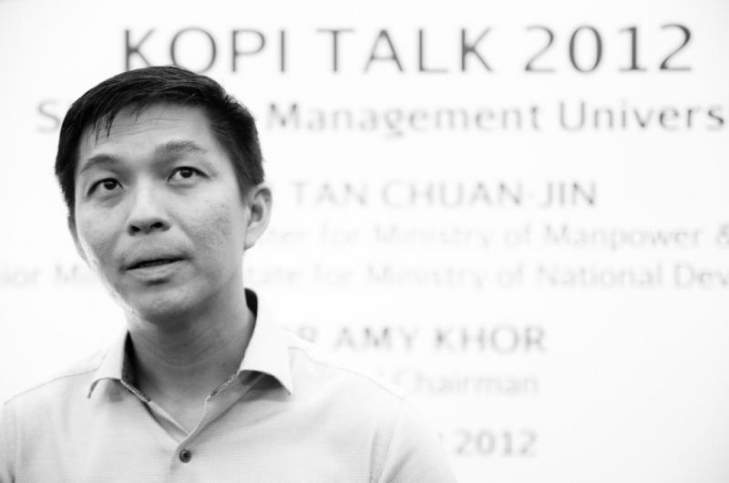
If you are running away from a chasing tiger with another person, how do you increase your chance of survival? You don’t have to outrun the tiger. You just have to outrun the other person.
This was brought up by Mr Tan Chuan-Jin, Acting Manpower Minister of Singapore in a forum with 100 Singapore Management University students when he was asked if Singapore’s drive to be ahead of the pack has encouraged its political leaders to be conservative and stick to proven formulas.
The dialogue session held in August 2012, was organised by the government’s feedback unit, REACH, and SMU’s student political association Apolitical to gather views from young Singaporeans on Prime Minister Lee Hsien Loong’s National Day Rally speech.
Singapore, dubbed one of Asian’s economic tigers, has enjoyed much progress in less than a century. While it was recently declared the world’s richest country, the voices of its citizens, whom many are worried by the influx of immigrant in recent years, to relook the future of the country has never been louder since its post-independence years.
Tan replied that Singapore has always thought of the box in its progress towards a developed nation. For instance, it invented water technologies to secure a stable water supply for and rebuilt a swamp land into a bustling work area for petrochemical companies.
He went on: “Do we change for change’s sake? Or do we keep something that is good but also knowing that what got us here may not get us there (the future)?”
But the world is different today and tweaks will have to be made to policies for them to do good for the people. Citing the recent government move to level up standards of pre-schools, Tan said: “Are we averse to changing? I would say that my own sense and in my own conversations, no."
On if there is a need for Singapore to stay ahead of the pack, Tan noted that capital and labour is very fluid in today’s globalised world. If Singapore does not compete sufficiently, companies will not come to invest in the country and create good jobs for Singaporeans.
Another student asked how is the government providing more space for citizen participation in the policy making process. Tan said that while collective awareness when making decisions is important, it is not easy to consult everyone on every major decision.
Tan, who is also the Senior Minister of State in the Ministry of National Development, used the government’s decision to build a road at Bukit Brown cemetery as an example of the dilemma.
The announcement of the proposal in 2011 created unhappiness from environment and heritage groups who felt they have not been consulted.
Tan said that consultations with the public may result in the leakage of asymmetrical information about the area’s future development such as mass rapid train station. This could lead to real estate speculation.
Stressing the importance of striking the right balance, Mr Tan said: “ At some point as leaders, you must have the capacity to listen, the sincerity to listen, take on board perspectives, society feedback and so on, but you must have the courage to make the calls. And it is not always a popular call.”
The evening also saw a lengthy debate on the issue of foreigners. With the influx of foreigners in recent year, the job market has also become more competitive than ever.
Responding to the students’ comments that companies seem to prefer to hire foreigners, Tan noted that local companies have feedbacked to him that it can be difficult to hire Singaporean workers because of the latter’s higher expectations.
He pointed out that discrimination in the work place also involves ageism and gender discrimination. “It (discrimination) is not always easy to prove, but when we can, we step in,” said Tan.
The foreign students in the audience reflected to Tan that they also face challenges in the job search. For instance, there are also employers who prefer to hire Singaporeans and foreign students have to find a job within three months of graduation in order to qualify for an employment pass.
Tan said that he sympathises with the students but he thinks “the job market is there” for both Singaporean and foreign job-seekers.
One student asked him if the government can do anything about xenophobia in Singaporeans. Tan said: “Should the government step in? Sometimes I think the government does too much…The collective value and character cannot be determined by the government.”
It is up to Singaporeans to make, not the Government, on the kind of society they want and how they behave towards foreigners, he felt.
Tan said: "All of you here have choices to make. Do you want to be consumed by hate, anger, unhappiness? Or do you want to say, let's do something positive.”
Last updated on 27 Oct 2017 .